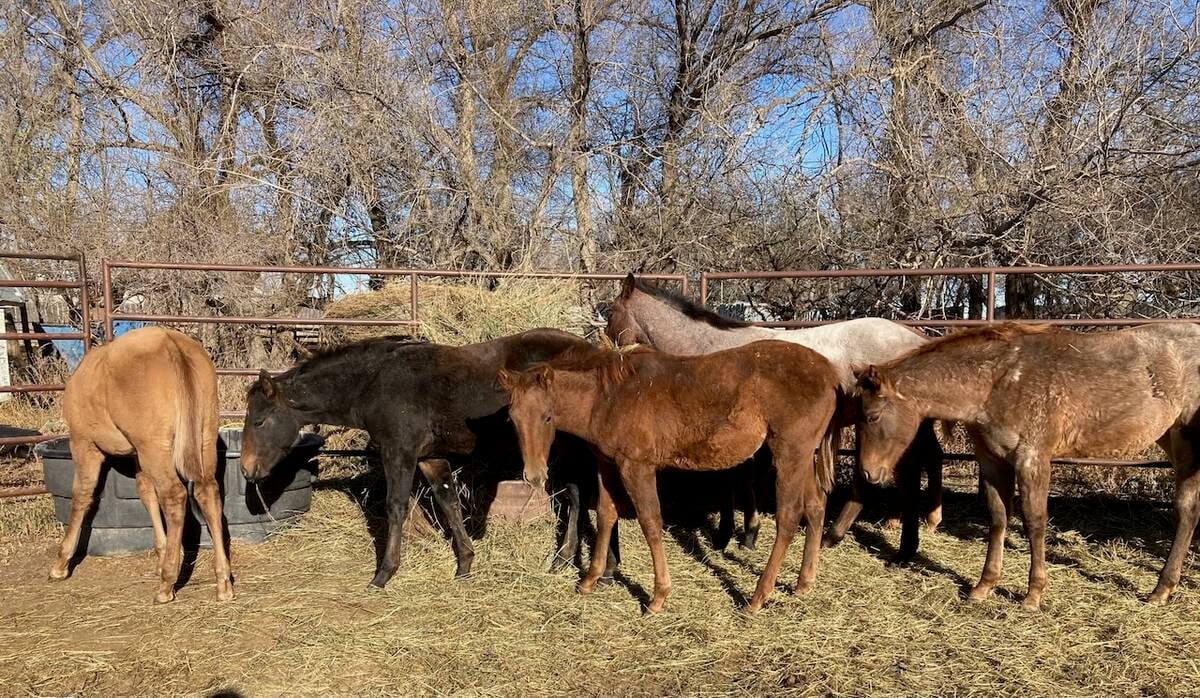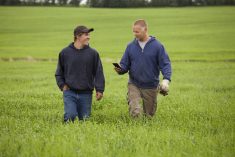I am curious who people might think of when they read the headline for this column.
Was it your new daughter-in-law who asks piles of questions about why you do things the way you do on your farm? Did you imagine your son-in-law driving quickly over the gravel as he left the yard? Is it your mother-in-law who just cannot seem to remember you need an email invite to block time for a farm shareholders meeting? Or is it your aging, fatigued father-in-law who is having a hard time “letting go” of having final say on big farm decisions?
A book I co-authored with Megan McKenzie, Farming’s In-Law Factor: How to Have More Harmony and Less Conflict on Family Farms, is now almost nine years old but it’s still used to empower families so each adult is seen and heard in the decision dynamics on farms.
Read Also

Fall clean-up and bringing animals home at the Eppich ranch
Winter is approaching which meant emoving old fence rows and bringing livestock home before the cold and the snow at the Eppich family ranch.
As we write in Farming’s In-Law Factor, there are many overlapping systems in play on a family farm.
First there’s the family circle, which typically includes parents, brothers and sisters, who may also be farm business partners or farm heirs, as well as in-laws. The next circle includes unrelated employees and family members who provide labour on the farm.
The management circle is where key operational and financial decisions are made. And then there is the ownership circle, where farm equity accrues to the farm owners.
Try drawing four circles on a blank piece of paper and assign the names of players on your farm to each circle.
How people are seen and heard in the decision-making process can vary widely in family farms. Often, the way in-laws are seen and heard is different than for family members who are farm successors. How different depends on the culture of your farm.
For instance, do the parents/founders acknowledge or value the input of their successors and also their spouses? Or does the culture have an unwritten rule: “Let’s just keep it simple and not let the in-laws be any part of decision-making.” Ouch!
It’s important to consider what your farm team truly values. An emotionally healthy farm team values honesty, respect, teamwork, skill affirmation and curiosity. It doesn’t pre-judge the outcomes of tough situations and it seeks to explore all possible solutions through research and by asking powerful questions.
If you have a daughter-in-law or son-in-law who is part of your farm team, try practicing this phrase: “I’m curious. What do you need in this moment to have a better understanding of your role and our expectations of you on this farm?” It is a powerful question. Listen carefully to the answer.
COMMUNICATION FRAMEWORK
Here’s a helpful communication framework developed by Marshal Rosenberg, author of Non-Violent Communication: A language of life, which includes tools for healthy relationships.
- Observe. What behaviours do you see on the farm? Do your in-laws go silent when you are in the room? Are you excluded from farm business decisions and then you hear all about it at the supper table from your frustrated spouse?
Try asking this directly to the founders, for clarity: “I’m curious. What is your intention for helping me understand the operation of this farm? If you intend for me to stay out of the decision-making process, that is not what I expected my role to be.”
Be careful in your language and avoid judgmental phrases like “you always…” or “you never…” An observation might be: “When I see you invite only the successors to the farm business meeting, I think there is a reason why I am being left out. I would like to know what that is.” - Feelings. If you’re frustrated at being left out, you need to identify and express your feelings. Try saying things like, “I feel scared when you say that.” Rosenberg maintains “by developing a vocabulary of feelings that allows us to clearly and specifically name or identify our emotions, we can connect easily with each other. Allowing ourselves to be vulnerable by expressing our feelings can help resolve conflicts.”
Hopefully your vocabulary is larger than mad, glad or sad. See this link to check out Lindsay Braman’s helpful tool called the emotion behaviour wheel. - Needs. I can relay countless stories of in-laws saying they need more respect, and founders asking for the same thing. If we express our needs, we have a better chance of getting them met.
The basic tenet of conflict resolution is to share your intent or your “why.” According to Rosenberg, emotional liberation involves stating clearly what we need in a way that communicates that we are equally concerned that the needs of others also be fulfilled.
I’ve often said we get the behaviour we accept, and love does not read minds. Are you able to take responsibility for your intentions and your actions? Are you making assumptions about what others on your farm team are thinking, feeling, needing and wanting?
A meaningful conversation, where people can share their thoughts and feelings and decide what’s needed, can start with asking great questions about what the intentions of others really are.
Are you able to ask the other person, “What do you need in this moment? Or in the next month? Or when you step back?” I’m fairly certain there are many farm mothers who would drop to their knees if someone sincerely asked them, “Mom, what do you need right now?” - Requests. You can make a request for certain behaviours and actions, and also ask, “What do you want from me?” Be clear and make sure to use positive language in asking for want you need.
Farmers often tell me they don’t have time to read. Rosenberg’s Non-violent Communication is also available as an audiobook, so there’s another option. We all long to be seen and heard on our farm teams. Let me know how new language and insights empower your decision-making.
















